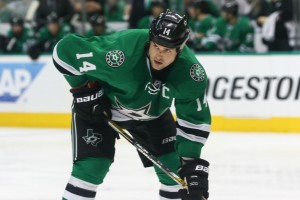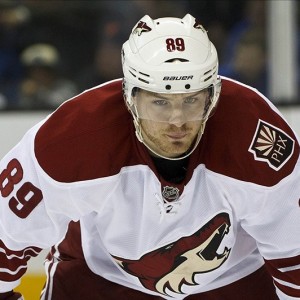I do like a good hockey tournament. The NHL rolls out one of the best tournaments of any sport every year: the Stanley Cup playoffs. Every four years, subject to the whims of the various stakeholders, we get to see an Olympic hockey tournament. It is especially fun to watch the elimination games, each in effect, a game seven equivalent.
But embedded in the NHL structure is a long, extremely physical season. The nature of the season does not lend itself to fitting in an additional, high-end tournament. As such, the World Cup of Hockey faces several substantive challenges.
A Quasi-New Tournament
The World Cup of Hockey takes place in Toronto beginning in mid-September. There are many challenges with this tourney.

I’ll start with an ending. The NHL season runs from October through June, making it the longest season of the major North American sports. And, therefore, the sport with the shortest offseason of the major North American sports. NFL football, the most physically comparable sport to hockey, has a season which starts a month earlier than the NHL (September vs October) but goes only through February. The NHL continues into June. This year, most NFL teams play their first meaningful game on September 11. Meaningful hockey games at the World Cup start that same week, on September 17.
For the players in the World Cup tournament, their hockey season start moves up nearly a month, shortening the offseason by the same amount. We’ve already seen several notable players withdraw from the World Cup of Hockey, often citing the need for additional recovery time. This list currently includes, among others, Duncan Keith, Jamie Benn and Niklas Kronwall. More are dropping out as the event gets closer. Phil Kessel is an example of a player who needs every day of the offseason, it is unclear if he will be ready for the start of the NHL season. Losing marquee players isn’t helpful to the tournament, though the reason is understandable. Recovery time matters, shortening it is problematic.
A second issue I have is straightforward. If I want to see the world’s best hockey players compete in a tournament, I want them at their best. If not at their peak, at least midseason form. There is a notable quality difference between midseason form and preseason form. The quality of hockey improves as players find their groove. This only comes from having played a meaningful number of competitive games.
I like seeing Sidney Crosby going head-to-head with Joe Pavelski. Especially between January and June, when they are at their peak. In September, their body clocks are telling them to ramp back into playing shape. Both players played well over 100 games last season, grinding it out well into June. Both played spectacular hockey along the way. It is a big stretch to want them peaking again in September.
http://gty.im/539141504
Part of the reason Pavelski and Crosby met in the Stanley Cup Final is because neither player has much of an off switch. These guys, like many of the World Cup participants, aren’t good at coasting. When the player on the other team happens to be among the best in hockey, they’ll dig down even deeper. It makes no sense to have these guys trying to play high-end hockey at the point in the calendar year when their bodies are mentally and physically accustomed to skating preseason practices.
Stanley Cup or World Cup
I can’t help but feel that playing for the World Cup diminishes the chances of playing for the Stanley Cup.
A player who is in the World Cup of Hockey and the Stanley Cup Final could find themselves playing roughly 110 meaningful hockey games during a stretch of nine months. Wanting players to peak at both the start and the end of this nine-month period is not conducive to peak hockey, but it is conducive to injuries. In part, because the season is longer, in part because of inadequate recovery time from the prior year.

In many cases, teams have new coaches and new players. Getting new players integrated into a team takes time. The World Cup tournament cuts into this opportunity. For the Sharks, the team I cover, eight players were slated to take part in the World Cup tournament — it is now seven, Tomas Hertl withdrew citing a less than complete recovery from a knee injury.
Wouldn’t it be helpful for Sharks’ Stanley Cup chances if newcomers like Mikkel Boedker and David Schlemko got a full preseason of practice with the guys they’ll be sharing the ice with? The Sharks, a team with a very demanding travel schedule, have found practice time limited during the regular season. For the Sharks and teams in similar situations, preseason practice time is critical.
From injuries to recovery time to team chemistry, there is one inescapable conclusion. If you want your team to win the Stanley Cup, playing in the World Cup will not help your chances.
September Baseball or September Hockey?
There is something odd about a tournament where the eight teams represent six countries, one region and one age group. As much as the tourney seems to want national pride involved, I can only imagine if the winner was the age-group defined team. While I expect O Canada to be played during a winner’s ceremony, I have to wonder what song might be played if the tourney is won by either the regional team or the age group team. There is no ’23-year-old and under’ national anthem.
I get the desire for hockey tournaments. It is tough to find a spot in the calendar with the NHL season as long as it is. Once every four years in mid-season, with the eyes of the world on the Olympic tourney, seems optimal. It is also probably about the most which can be, or should be done. Even on the viewer front, the timing works. The NFL season is over while baseball teams are early in training camps. Basketball has yet to hit its stretch drive. There is a spotlight for the Olympic hockey tournament which it doesn’t need to share.
The World Cup of Hockey, however, coincides with the NFL season and the baseball stretch drive. Host city Toronto is likely to have many eyeballs on baseball. The Toronto Blue Jays are leading their division, in a very tight race with Boston and Baltimore, with the Yankees lurking a bit further back. The Blue Jays play series against the Yankees, Red Sox and Orioles during the World Cup of Hockey. The chances are nearly 100% of very meaningful Toronto baseball overlapping with the hockey tourney.
Hockey gets one top-tier tournament a year. Typically, hockey gets one top-tier international tournament every four years. This is all the sport really needs and given the demands of the NHL season, it is about the most it can handle. To cut short the already too short offseason and place high-end players in an event at the start of the year when they are the least sharp and most vulnerable; it doesn’t add up. This World Cup of Hockey tournament is a step too far.